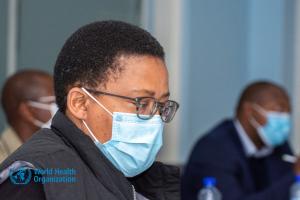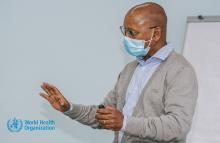WHO holds health systems strengthening dialogue with private sector
WCO Lesotho held a one-day dialogue with private health service actors with the ultimate objective to strengthen health systems in Lesotho through the Access to COVID19 Tools Accelerator (ACT-A) programme.
The ACT-A programme funded by the Canadian government is a novel initiative that brings together governments, scientists, businesses, civil society, philanthropists and global health organisations to address COVID-19 challenges and help protect everyone from the virus and its impact.
The purpose of the ACT-A is to support the development and equitable distribution of diagnostics, treatments, vaccines and protective personal equipment to reduce mortality and severe disease, restoring full societal and economic activity globally.
WHO is also a secretariat member of the four ACT-A work pillars, namely, vaccines; treatments; diagnostics and the health systems connector (HS-C)?
The HS-C provides cross-cutting health systems support for the COVID-19 response, including the deployment of tools, vaccines, diagnostics, therapeutics, PPE and oxygen. The HS-C further focusses on supporting countries to undertake critical actions to unlock health system bottlenecks that stand in the way of COVID-19 tools deployment.
Dr. Richard Banda, WHO Country Representative said this marked a new chapter in private sector collaboration & support and should not be taken for granted, “If there is one thing that COVID-19 has taught us is that collaborated efforts are the pillar of good health systems but mostly that the role the private sector and non-governmental organizations is pivotal in times crisis” Dr Banda said.
He said WHO has three billion targets in general program of work, first target is to one billion people benefiting from access universal health coverage, “people should not be impoverished trying to access health” he said.
Second is, one billion people are better protected from health emergencies and thirdly, one billion people are enjoying better health and well-being, “this can be achieved only through partnerships such as these; where we can work together to strengthen health systems, tackle other diseases like non-communicable diseases.
Dr. Misfin Zbelo, HSS and Continuation of Essential Services lead at WHO said there are so many areas this partnership can bring change into.
“Today COVID 19 presents us with a unique situation and even in the coming years therefore we need all actors to align with government policies but to also provide services; to serve the people” Dr. Zbelo said.
“Mutual trust and interdependency on what we are doing is crucial and we understand that this relationship cannot be one sided” Dr. Zbelo said.
Princess Sekyere Bih, WHO External Relations and Partnerships expert said WHO primarily engages with government and offers technical support and other support, however, due to the ongoing increase of actors in the public health space it has become important that it also engages various none-state actors in achieving public health in various countries.
Sekonyela Mapetla from the Lesotho Council of NGO’s said they were grateful for the opportunity and that for a very long time they have been worried on when their engagement and presence in the country would be utilized in the fight against COVID. He said civil societies, NGO’s and the private sector played a big role during the rubella vaccination and they can still do that even for the COVID-19 vaccine.
Non-state actors from the health sector, civil society sector, media sector and the commerce and industry sector were part of this meeting pledging to undertake different health related activities such as Risk Communication and Community engagement, frontline workers safety and protection, data collection and private sector adherence to COVID protocols.

